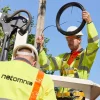UPD4 Child Internet Safety and Censorship Measures Unveiled for UK ISPs
The Prime Minster of the United Kingdom, David Cameron, has unveiled the government’s plan for helping to protect children online. As expected it includes a series of solutions including one that requires all of the country’s largest broadband ISPs to adopt strict network-level filtering blocks for adult websites and content (Parental Controls).
It’s no secret that the government and many politicians in general have been working to clamp down on online porn and illegal child abuse content for the best part of two years now (note: the IWF already works with ISPs to block child abuse content). Today the outcome of that effort to create a new Code of Conduct will be published, although the Prime Minister has already revealed the basics of what will be included.
Advertisement
Summary of the New Measures
* Adult content filters to be enabled on all new mobile phones (this already happens for most people).
* Adult content banned from public Wi-Fi services (some public hotspot operators already do this).
* It will be a criminal offence to possess pornography that depicts rape.
* Videos streamed online in the UK will be subject to the same restrictions as DVDs and BluRays sold in shops.
* Google, Bing and other major internet search engines will have to block any results/sites and specific search terms blacklisted by the Child Exploitation and Online Protection Centre (i.e. this mostly relates to child abuse content). It should be said that Google and the like already remove related sites once they’ve been notified.
* The Child Exploitation and Online Protection Centre (CEOP) will also gain new powers to examine P2P (internet file sharing) networks for child abuse content and to hopefully help trace their users (working alongside the police).
* People whom attempt to access websites that contain child abuse content will also be met by a strict warning about the risks of doing so.
* The country’s largest broadband ISPs (BT, Sky Broadband, TalkTalk and Virgin Media) will all need to enable automatic network-level filtering of adult websites (i.e. Active Choice+), although you will be given a choice to opt-out (though the opt-in “Yes” box will stay pre-ticked if you ignore it).
The government expects all of these new measures to be introduced by the end of 2014 (though the network-level filtering must be ready for new users by the end of 2013) and the communications regulator, Ofcom, will be tasked with overseeing this effort. But arguably one of the most contentious elements continues to be the enforced adoption of network-level filtering.
Essentially network-level filtering means that the broadband provider controls the website blocking at its end of the service and this allows the restrictions to be imposed across all of your networked devices.
ISPs will also give customers a list of options for blocking other non-porn types of “adult” content (e.g. social networks, gambling, self-harm sites etc.). Admittedly this makes it a lot easier for parents to use but it’s far from perfect (we’ll get to that later) and could give some people a false sense of security.
David Cameron, UK Prime Minster, said:
“When someone sets up a new broadband account the settings to install family friendly filters [Parental Controls] will be automatically selected. If you just click ‘next’ or ‘enter’, then the filters are automatically on [and] they will cover any device connected to your home internet account.
No more hassle of downloading filters for every device, just one click protection. One click to protect your whole home and keep your children safe. Now once those filters are installed, it should not be the case that technically literate children can just flick the filters off at the click of a mouse without anyone knowing.
So we have agreed with industry that those filters can only be changed by the account holder, who has to be an adult. So an adult has to be engaged in the decisions.”
The government will most likely attempt to spin this as a “default-on” solution (ISPs don’t like that) but in reality most of the big ISPs have already advised us that this is a moot point since everybody would be asked to make a decision about whether the filters are enabled or not (How the Filters Work). Never the less, if the new measures are not introduced as required, there’s also the ominous threat of legislation for future consideration.
Advertisement
It’s worth pointing out that many free Parental Control solutions already exist and most people probably have access to them already but probably never realised (e.g. on your router, Windows 7/8 PC, MAC OS computer, iOS, OpenDNS etc.). In that sense the new network-level solution will certainly be a lot easier to find and use but is it really better?
Technically speaking ISPs are only conduits of information and thus any “block” they impose can only ever be skin deep because they have no control over actual online content like web hosting providers. A competent child, sometimes even the youngest ones, will also quickly be able to figure out any number of different ways around such filters. It’s not hard and as we all know from our own childhood, school yard solutions spread like wildfire.
Many such filters often also block legitimate sites too (e.g. the national lottery, big shops that include underwear sales, sex education or general news content that merely talks about related topics) and provide no effective means by which unfair restrictions can be appealed or reported. O2 for example blocks websites that have been setup to help men whom suffer from domestic violence (here).
Many of the mistakes mentioned above occur due to technical errors but incorrect categorisation is also a clear problem. Suffice to say that the scope for mission creep and overzealous censorship is a serious concern and putting too much power in the hands of commercial ISPs can be dangerous. But at least the Daily Mail will be happy, unless ISPs block them too over the racy pictures on their website.
Advertisement
Adrian Kennard, Director of UK ISP Andrews & Arnold (AAISP), said:
“The problem is that it is a call for censorship, and that is bad. We need open communications in the world to keep governments in check. The second we go down the road of censorship we are opening Pandora’s box. This is not speculation as we have seen it – filters put in place only for IWF blocking of child abuse images are already being used to block alleged terrorist sites and by civil court orders to block sites alleged of encouraging copyright infringement.
Something so far from child abuse images you could not get – copying material for personal use is (as far as I know) actually legal in some countries, and even here it is often a matter of a civil wrong justifying damages, and not an actual crime – yet the same systems designed to stop only the most heinous crimes is being used to stop something considered “OK” by a lot of the population and even some whole countries. It shows how these things get distorted – no system will ever stay as intended, no matter how pure those intentions are.”
Jim Killock, Executive Director of the Open Right Group, added:
“Cameron’s announcement is symptomatic of the way the Internet is viewed and treated by policy makers. The technical challenges and consequences of policies are viewed as less important than the moral purpose justifying calls for action. Policies are announced before they have been properly considered. And worse, these announcements risk being another case of blaming the commercial intermediaries because that is easier and cheaper than doing what is really necessary.”
As a side note it is worth mentioning that the new ISP and search engine rules will only be applied to the largest ISPs, which account for around 95% or more of home broadband subscribers.
Smaller ISPs and the many thousands of lesser known unfiltered search engine websites will be unaffected. Part of the reason for this is because smaller ISPs are unlikely to have enough money to develop their own network-level filters without help from the government.
UPDATE 10:18am
Incidentally AAISP has just added a new option on their order page that gives customers a choice between Censored and Unfiltered Internet access. The catch is that you can’t subscribe if you choose to have filtered access and are told to pick another provider.

UPDATE 12:47pm
Cameron’s full speech is now available from the official Number 10 website (here).
UPDATE 1:41pm
Added a comment from the Internet Service Providers Association.
Nicholas Lansman, ISPA Secretary General, said:
“Online child safety is a priority issue for the internet industry. We’re pleased the government recognises and has welcomed the considerable work ISPs are already doing. They are investing a great deal of time and expertise into offering customers a choice over installing free and easy-to-use content filters.
However, filters, which can lead to over and under blocking and can be easy to circumvent, are only part of the solution. As recommended by the last government review, a more holistic approach involving retailers and manufacturers is required, along with an emphasis on education, awareness and parental mediation.
On the separate issue of illegal child sexual abuse images, in 1996 the industry set up and has continuously supported the Internet Watch Foundation and this has resulted in the reduction of child abuse images hosted within the UK down to less than 1% of the global total. The blocking of child sexual abuse images plays an important role in preventing users from stumbling across this material inadvertently but the most effective means to actually protect victims and prosecute those committing crimes it to remove images at source. For this, we will continue to follow established procedures, working with law enforcement, particularly CEOP, who need to be provided with the necessary resources and tools to identity and prosecute offenders.”
UPDATE 23rd July 2013
Something we overlooked in Cameron’s speech is the part where he encourages smaller ISPs to adopt the same solution. “I want this to be a priority for all internet service providers not just now, but always [and] that’s why I am asking today for the small companies in the market to adopt this approach too“. But without funding most would be unlikely to do that.
Mark is a professional technology writer, IT consultant and computer engineer from Dorset (England), he also founded ISPreview in 1999 and enjoys analysing the latest telecoms and broadband developments. Find me on X (Twitter), Mastodon, Facebook, BlueSky, Threads.net and Linkedin.
« A Look at the Future Fibre to the Distribution Point FTTdp Broadband Tech
















































Comments are closed